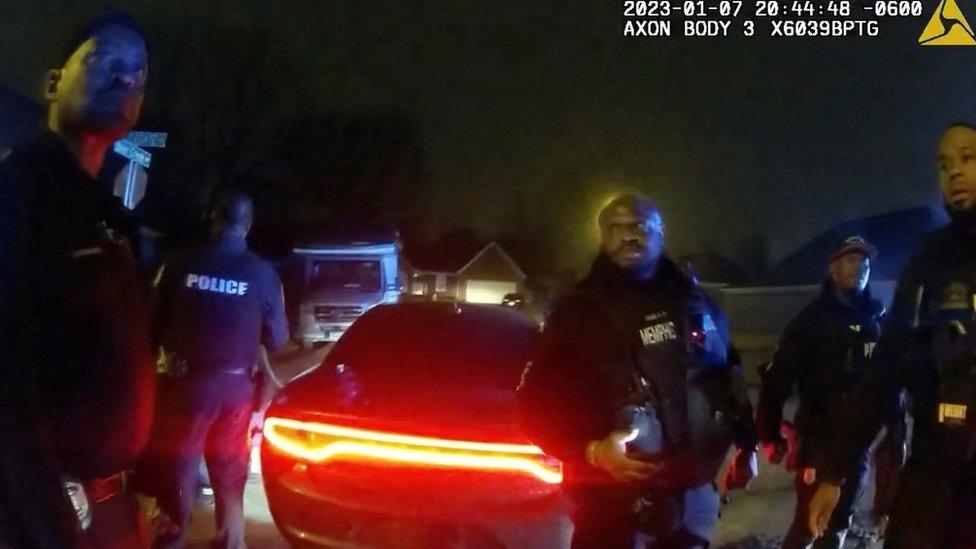'Shameful and inhumane' - Black officers reckon with death of Tyre Nichols
- Published
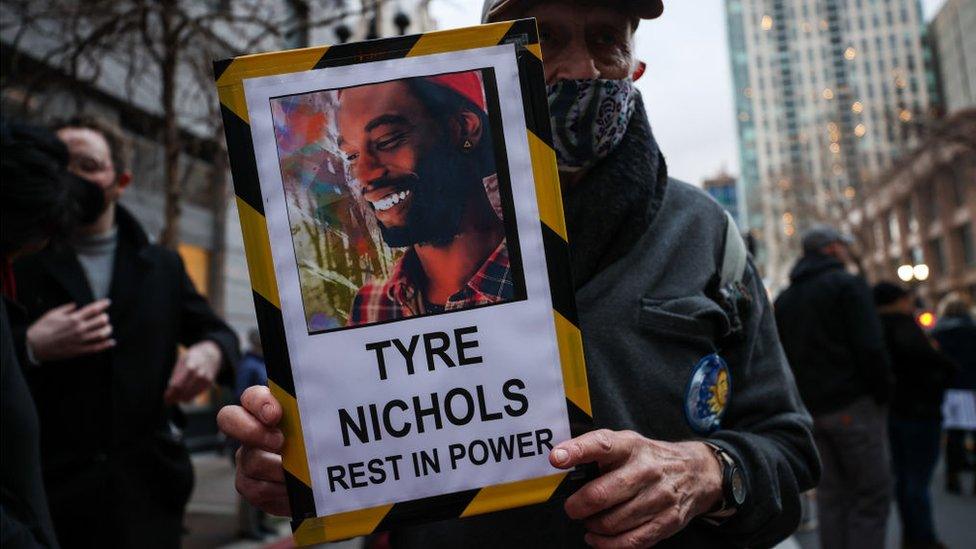
Tyre Nichols' death in Memphis triggered protests in cities around the US
The death of Tyre Nichols has brought renewed focus on the issue of race and policing in the US. The 29-year-old died after a violent encounter with five black officers who have since been charged. The BBC spoke to serving and retired black officers about what happened - and what needs to change.

Terrance Hopkins has served in the Dallas Police Department for more than 30 years. He said the video footage of Tyre Nichols' arrest - which showed officers repeatedly punching and kicking the father of one after a traffic stop - left him grief-stricken and embarrassed.
"I'm extremely disappointed because they've dishonoured our legacy - our legacy in this profession is to be the officer who does not have those biases against black people," he told the BBC. "That's one of the reasons why I'm in the department. Their actions embarrassed our part of law enforcement."
As president of the Black Police Association of Greater Dallas, Mr Hopkins said what the police did triggered shame and disappointment among black officers. "I know that if I come across a black individual or suspect that he's going to be treated right," he said. "There is not going to be an ounce of racism in that contact."
"But what these guys just did set us back to the Dark Ages."
De Lacy Davis, who is now retired, joined the East Orange New Jersey Police Department in the 1980s and later founded Black Cops Against Police Brutality. He said what happened in Memphis was "shameful, inhumane and a poor representation" of black police officers.
"I've been meeting for two days with black police officers around the country that I have relationships with," he said. "[We] need to take a position nationally so that we send a clear message about what we don't stand with. That's number one."
Mr Davis said the incident pointed to a clear failure in the department's culture. "It doesn't matter what colour the cop is - what matters is the culture of the organisation," he said. "Because the race of the officer is irrelevant, it is the practice of the institution."
He added that police violence towards ethnic minorities was - in his view - "baked into the system".
"We have a responsibility to our community as professionals, either those that are still in or those who have retired like me to carve a path for the next generation of black officers," Mr Davis said.
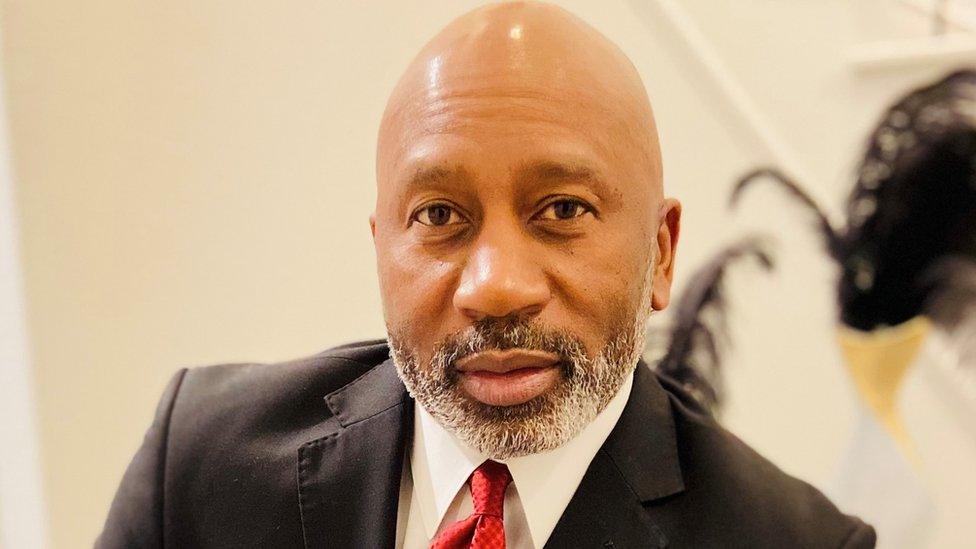
Terrance Hopkins has been with the Dallas Police Department for over 30 years and serves as the president of the Black Police Association of Greater Dallas.
Howard University law Professor Lenese Herbert is a former assistant US attorney. "One of the best things about that job was working with police officers with pride and standards who were lawful," she told the BBC.
She draws a distinction between ordinary policing and the way the officers behaved during the Tyre Nichols arrest: "This was not in any sense lawful policing. This was the… conduct of those who are used to getting away with violence and abuses."
"This may be done under the guise of policing, but this was brutality in the name of, under the badge of, under the colour of, law enforcement," she said.
The five officers charged with second-degree murder have not entered a plea, but lawyers for two of the men earlier said they would plead not guilty.
Prof Herbert said the race of those involved was less significant than the fact they were police officers in the first place. "The only colour that matters here," she said, "is blue. The blue was the thing that governed the activities [in the Tyre Nichols arrest]."
Some officers, however, said they are worried about the impact Mr Nichols' death would have on the image of black police officers more generally - and on efforts to build more diverse police departments.
"We should be thinking: Don't be a part of the problem, be a part of the solution," Mr Hopkins said. "If you're seeing your people get unfair treatment from a generally white officer, why don't you become a good officer who's not going to do that? Now, that mindset is tainted based on what has happened."
"Our applications are so low on the African American side," he said. "It's going in the wrong direction."

More Tyre Nichols coverage:

An analysis by USA Today found that in at least 50 medium to large US cities, the percentage of black officers was less than half that of the black population. The problem was compounded after the high-profile death of George Floyd, when applications reportedly dropped and early retirements spiked.
Both men said they empathised with the stigma of joining the police as a black officer and had experienced it themselves. Mr Davis met resistance even from within his own family. "'I can't believe you work for the police,'" they told him.
People in the neighbourhood where he lived - which was the same area he also patrolled - would throw rubbish into the seats of his car. "When I stopped getting garbage in my car, it meant I had built a better relationship with the community," he said.
And when Mr Hopkins first joined in 1990, he too faced criticism from those who looked like him. "I got called a sell-out," he said. "Police were seen as the traitors of the black community. That was the perception for some. I'd be lying if I told you I didn't think about that."
"The overwhelming majority of us are doing it right," Mr Hopkins said. "This incident does not erase that other 99%. I want us to continue to want to be in law enforcement, and we need those numbers to remain as high as we can get them because there's no other community plagued by these issues as much as the African American community."
"We need our stake in law enforcement," he said.
Watch: New footage shows deadly arrest of Tyre Nichols
Whether or not increasing diversity in the police will solve the issue of violence towards communities of colour is disputed. And the death of Tyre Nichols points to something experts and activists have long said - that discrimination in policing goes beyond the individual level and is systemic and institutional.
"When policing as an institution has a training problem, then it means that all police officers have a problem," Mr Davis said. "Because the training is flawed."
He proposes putting more black officers at the head of police academies and police training courses - those who have had a "black experience that is consistent with the community's". He also believes training must be tied to the values of responsibility, accountability and integrity. And when those values are breached - officers must be held responsible.
Mr Hopkins, meanwhile, believes there "has to be a push" to recruit more black officers. "The stigma is going to have to fade to open up the minds and hearts to a potential career in law enforcement," he said.
Mr Davis wants to see a clear change in behaviour. "What we can do is give them a different example to look at - and that is what has not happened yet."
Related topics
- Published1 February 2023
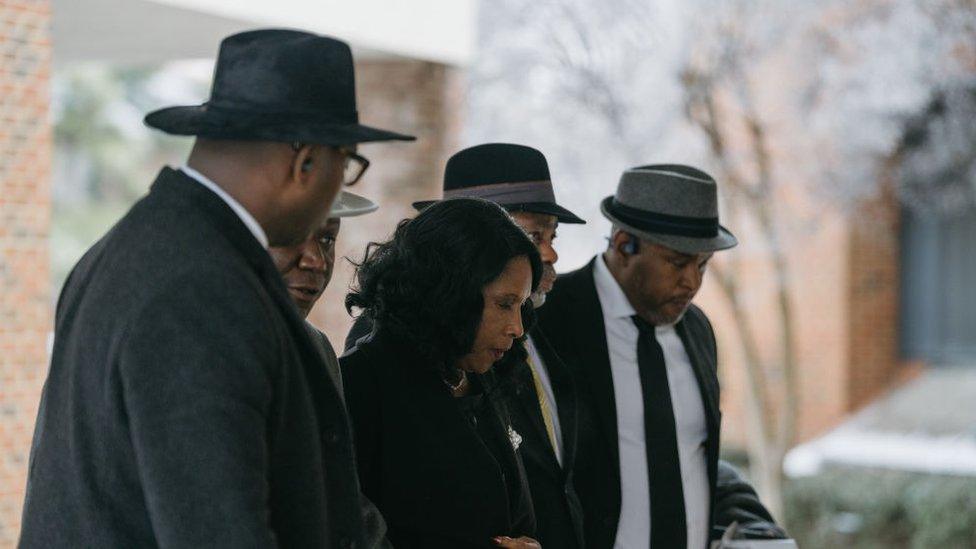
- Published1 February 2023
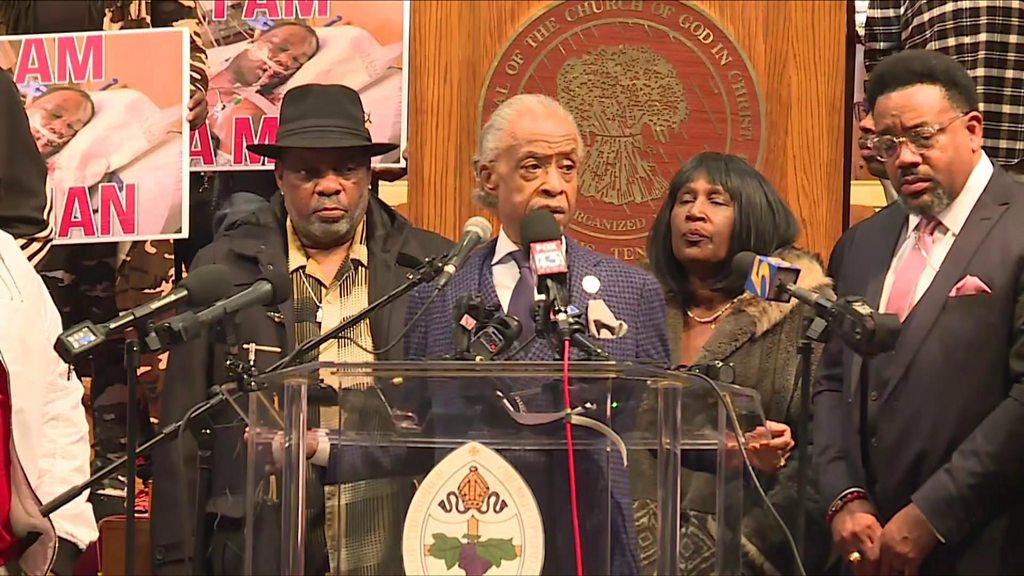
- Published29 January 2023
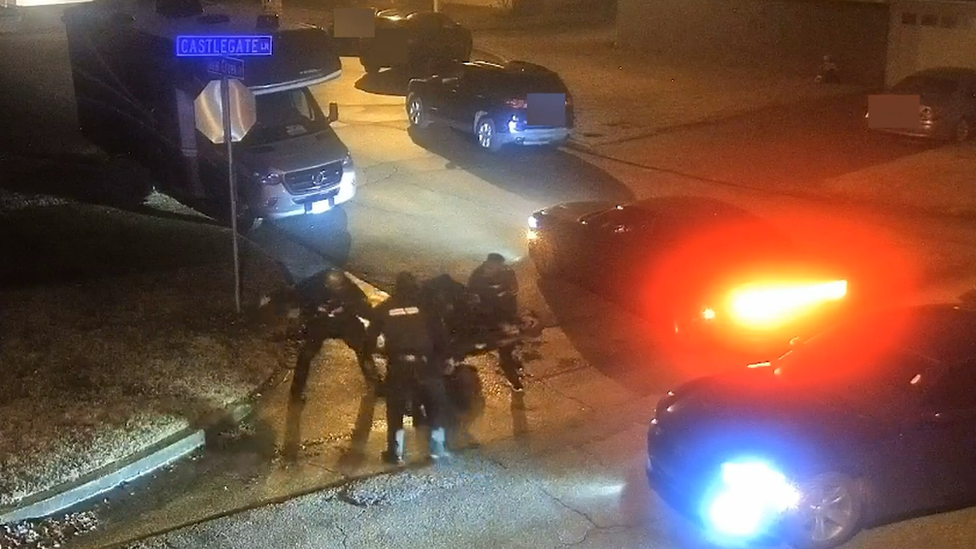
- Published9 September 2024
